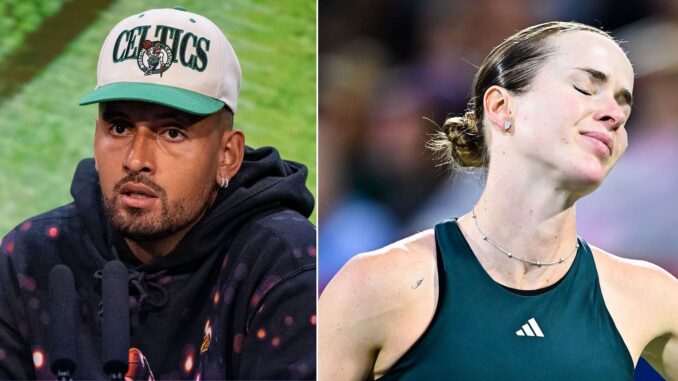
The 2025 National Bank Open in Montreal was meant to be a stage for Elina Svitolina to showcase her resilience as a former world No. 3 and a beacon of strength for Ukraine amid its ongoing war. Instead, her 6-2, 6-2 quarterfinal defeat to Naomi Osaka on August 5, 2025, was overshadowed by a torrent of hateful online abuse, including death threats and racial slurs targeting both her and her husband, Gael Monfils. The Ukrainian star, also a devoted mother, took a bold stand, exposing the vitriol on Instagram and condemning the “shameful” behavior of disgruntled bettors. Nick Kyrgios, the outspoken Australian tennis pro, swiftly voiced his support, labeling the abuse “disgusting” in a powerful show of solidarity that amplified the call for change in the toxic culture of online harassment in tennis.
Svitolina’s performance in Montreal had been nothing short of inspiring. The 10th seed powered through early rounds, defeating Amanda Anisimova and Anna Kalinskaya without dropping a set, before facing Osaka, a four-time Grand Slam champion in top form. The 68-minute loss was a setback, but the real blow came when Svitolina checked her phone and found a flood of vile messages. Some wished for her death, others falsely accused her of “selling matches,” and one chillingly hoped that Russia would “kill all you Ukrainians,” referencing the war devastating her homeland. The abuse also targeted Monfils, a French tennis star who is Black, with racial slurs like “useless monkey.” Svitolina, undeterred, shared screenshots on her Instagram story, delivering a searing rebuke: “To all the bettors: I’m a mum before I’m an athlete. The way you talk to women—to mothers—is SHAMEFUL. If your moms saw your messages, they’d be disgusted.” Her words struck a chord, highlighting the misogyny and cruelty that female athletes, particularly mothers, face in the digital age.
Kyrgios, no stranger to online criticism himself, was among the first to rally behind Svitolina. His one-word response on X—“Disgusting”—carried the weight of his own experiences with social media hate. “I deal with it all the time. People just think raising the finger, abusing someone, or making racist comments is acceptable in this day and age, and I just don’t think that’s acceptable at all,” Kyrgios said in a past interview, reflecting on the emotional toll of such attacks. He has previously defended players like Naomi Osaka, who faced heckling at Indian Wells, and emphasized the challenge of ignoring negativity: “It’s so accessible now to go on your phone, social media, Twitter, Instagram, and just see so much negativity. You may not take it in, but subconsciously it’s still going into your brain.” His support for Svitolina underscores a growing movement among players to confront the scourge of online abuse, particularly from bettors who lash out after financial losses.
The issue is not new but has reached alarming levels. A 2024 study revealed that nearly half of all social media abuse directed at tennis players stems from angry gamblers, with 458 players targeted by over 8,000 abusive posts last year alone. British star Katie Boulter, who faced death threats during the French Open, described the abuse as a norm that players must endure, telling the BBC, “At the very start of my career, it’s probably something I took very personally… getting comments about the way you look.” Svitolina’s husband, Monfils, has also faced similar vitriol, humorously calling out bettors after an early Stuttgart loss: “You’re writing that I’m s***, I know I’m s***, we both know I’m s***, and you still bet on me? Who’s the dumbest between you and me?” His lighthearted jab belied the seriousness of the issue, which Svitolina’s ordeal has brought back into sharp focus.
Svitolina’s courage in exposing the abuse, coupled with her advocacy for Ukraine—she recently shared an emotional response to Russia’s missile attacks on Kyiv—has made her a symbol of resilience. Her 2025 season, which included a title at the Open de Rouen and quarterfinal runs at the Australian Open and Indian Wells, showcases her ability to compete at the highest level despite personal and professional challenges. As she prepares for the Cincinnati Open and US Open, her stand against online hate has sparked renewed calls for action. The WTA and ITF have implemented AI-driven tools to filter abuse, but players like Svitolina and Kyrgios argue that more must be done by social media platforms and betting companies. “Now you just have to use it as motivation, but that’s easier said than done,” Kyrgios noted, encapsulating the mental fortitude required to rise above such vitriol. As the tennis community rallies around Svitolina, her defiance and Kyrgios’ outspoken support highlight a critical moment in the fight for a safer, more respectful environment in the sport.
Leave a Reply